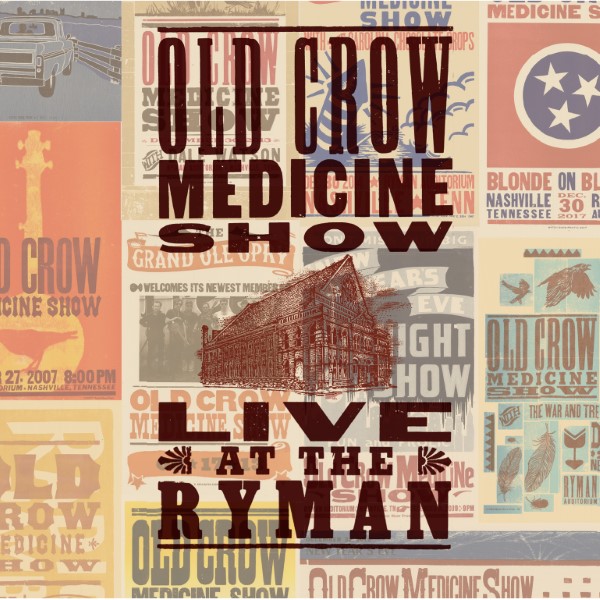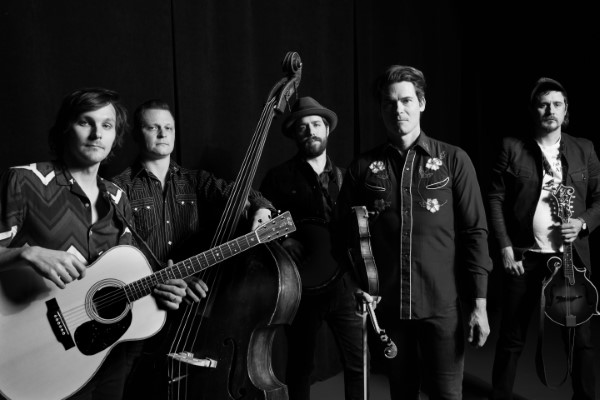

Old Crow Medicine Show. Photo by Crackerfarm
Grand Old Opry inductee the Old Crow Medicine Show is the best present-day representation of the Opry’s rip-roaring 1920s roots, deservedly winning one of country music’s highest honors without so much as a single mainstream chart hit. It should go without controversy to say that the Medicine Show laid much of the groundwork for the now-thriving Americana music scene. And Americana, in the truest original sense of the term, fairly drips from the band’s unpretentious and amiable acoustic-centered recordings and live performances.
The old-time string-band music that served as the band’s bedrock influence was a sound that initially drifted down from the Appalachians and up from the coal mines lurking deep beneath that mountainous terrain, touching upon both the emotional heights and depths of earthly life with tunes both rousing and heartrending. The band will roughly split the distance between those topographical extremes at 5 p.m. on Sunday, Sept. 8, focusing on the more uplifting side of roots music as they perform a subterranean show at Pelham’s The Caverns, a location well-suited for the sextet’s salt-of-the-earth sound.
In March of 2013, Old Crow played on a Bluegrass Underground show and TV taping at the series’ previous venue, the Volcano Room in the Cumberland Caverns. Absent from the lineup at the time, though, was the group’s multi-instrumentalist/singer Cory Younts, who’d been tapped to tour the globe with Jack White and was on a band-approved hiatus (more on that in a minute). Younts, a Nashville native and 2002 MTSU graduate, has never played, or even seen, a concert in Middle Tennessee’s caves . . . but he did once explore them—and even slept inside one—on Boy Scout outings. Younts’ personal musical journey could, in certain respects, be likened to that of a quick-learning novice spelunker crawling through unfamiliar corridors and finding inspirational discoveries along the way.
It was while working at a Boy Scout camp, in fact, that Younts—then an 18-year-old drummer whose main dishes were jam bands, jazz and classic rockers such as Led Zeppelin—first heard the old-timey sound that would change his life. A fellow camper had put on a copy of Shady Grove, a collection of traditional tunes played by Jerry Garcia and David Grisman, and Younts was hooked by what he heard. “It was a very simple record—just guitar and mandolin for the most part, and two voices,” Younts says, adding that the sparse instrumentation made it easy to hear what was actually going on.
“Sometimes with bluegrass, there’s so much going on . . . you don’t really know what instrument is doing what,” says Younts, figuring himself fortunate for a first listen that revealed the unadorned beauty of the age-old songs and the instruments playing them. The experience sent the drummer down the path of discovery, where he subsequently bonded with bluegrass linchpin Bill Monroe, deft-fingered duo Flatt & Scruggs, and other venerable virtuosos playing in that vintage style.
Mandolin in particular seemed to speak to Younts, who taught himself to play the instrument while attending Middle Tennessee State University. He’d enrolled in 1998, hungry to go deeper with his musical education. “I just really started loving the piano, and just wanted to be able to do something other than play drums,” he says. “I didn’t know what a black key was, a white key, a chord, a scale—I didn’t know any of it whatsoever. I just got very ambitious and decided I was going to go to MTSU and be a music major.”
Younts admits it was a tough slope to scale, but he quickly adds that his instructors were understanding about his non-academic goals and appreciative of his commitment to learn—however slowly his progress may initially have come. Younts notes that he was “really, really impressed with that faculty back then—this was fall of ’98 until ’02—and that music faculty was really tolerant, really hard-working, and cared to teach people like me who had never read music before, and really believed in the students.” He switched to a recording industry major midway into his degree work but also acquired solid keyboard chops and a knowledge of music theory, as well as the mandolin skills he honed on his own time.
While at MTSU, he collaborated with some friends who, while generally simpatico, didn’t exactly share Younts’ then-staunchly traditionalist vision. “I wanted to wear white shirts and tuck them in . . . wear pants up to our belly-buttons,” he recounts with a laugh. The trio, whose members were never altogether united in their stylistic objectives, did find agreement in the decision to form The Swindlers with Justin Townes Earle, son of alt-country artist Steve Earle. While busking on the streets in downtown Nashville in the early 2000s, The Swindlers shared their makeshift concrete stage with a bunch of newer guys in town: Old Crow Medicine Show.
Old Crow revisited its early busking roots in 2012, when band member Cory Younts was on hiatus. Younts’ initial acquaintance with the band took place a decade or so earlier in just such a downtown-Nashville scene.
“I saw them, and thought, ‘Who are these guys? They are really good.’ So I befriended them and used to go check out every show (of theirs) I could at the Station Inn,” Younts recalled. After The Swindlers dwindled and Younts did a three-year stint with Bobby Bare Jr., he found himself again teamed with Justin Townes Earle. In October of 2007, he had his maiden Ryman Auditorium experience—playing with Earle and opening for his now-favorite band—none other than Old Crow Medicine Show.
Since joining OCMS nearly 10 years ago, Younts has played the much-revered Ryman probably around a dozen times, and the band’s soon-to-be-released Live at the Ryman album cherry-picks those performances, featuring guests including retro-country-leaning singer Margo Price and harmonica hero Lee Oskar (whose instantly recognizable sound still cuts through the airwaves daily when War’s “Low Rider” or “Cisco Kid” invariably pops up). But this is still 2007, remember, and the Ryman hadn’t yet become a routine reality for the MTSU grad despite a gradual increase in career momentum.

“It was so, so awesome—that was my first experience on the Ryman stage,” Younts begins. “I stayed all night and I got to wander around, and stand on the (hallowed Opry) circle, and all that, and on top of that, I got to watch my favorite band play. It’s life-changing for anyone who gets to play on that stage. It really, really makes you think about where you’ve been, and what are you going to do.”
While thinking about what might lie beyond his milestone Ryman experience, Younts couldn’t have guessed what would happen almost exactly two years later. In October of 2009 he would be invited to join Old Crow Medicine Show for a three-week West Coast tour, an opportunity that led to full-time membership in the band. The key, he says, was his uncommon arsenal of drums, piano, mandolin, harmonica and vocals.
Cory Younts does drum duty on a fan-videoed track from the Tennessee Pusher album, a departure of sorts for Old Crow that opened the door to membership in the band.
The band’s most recent album at the time, Tennessee Pusher, had featured full drums for the first time, played by the legendary Jim Keltner, and included contributions from Tom Petty & the Heartbreakers’ keyboardist, Benmont Tench. Being proficient on both piano and drums made Younts the ideal candidate. Still, he’s quick to agree that those two particular musicians’ shoes were big ones to step into.
He stepped into another such loose pair early in 2012, when Jack White needed a utility man with Younts’ versatile skill set to join him and his band on an 11-month world tour. The unexpected call came with “a few days, maybe 48 hours” to make a decision, he remembers. “Of course I called the Crows and told them, and at that time there was a little bit of transitioning going on with the band, so they really didn’t have much of a plan for 2012 yet. So they were very, very supportive of me going away. And they all wanted me back.
Cory Younts can be seen performing on mandolin and backing vocals on this selection from Jack White’s 2012 Austin City Limits appearance.
“It was a lot different, you know—I mean, Jack is quite a rock star and a celebrity. The first show we did was Saturday Night Live. So no warm-up gig, nothing like that. It was being thrust right into the big time,” he says. “It was really fun, but to be honest, I . . . you know, the Crows are really where I belong, Working with Jack was great and all, but I’ve never been in a lot of rock ’n’ roll bands, and Old Crow is just where I fit the best.” Younts adds that lower-echelon fame is what all his bandmates agree they’re most comfortable with.
“You lose a lot of your privacy and your ability to just be a normal guy if you’re as big as Jack. We don’t want to be quite that big. Because everybody . . . especially now, everybody’s a family man,” Younts explains. “We’ve got a lot of kids, and a lot of groceries to shop for.” The band’s average-guy vibe, Younts reckons, “is one thing that our fans are really able to see.”
One thing Younts did bring back to his musical home base as a result of his year with Jack White was an onstage freedom of movement he hadn’t previously explored. “Coming back from the Jack world, I would say (I brought) more stage presence. You know, a lot more energy, even though Old Crow has plenty. I came back with a lot of confidence to jump around. There was a lot of moving around, and a lot of rocking out (on Jack White’s stage).” OCMS isn’t a rock band, of course, so Younts channeled his newfound stage energy into a lighthearted but athletic skill that perfectly suited the band’s history-honoring musical approach: tap dancing.
A fan’s phone video captures the fancy footwork of Cory Younts during a high-stepping moment in an Old Crow Medicine Show concert.
While Younts and his fellow Crows have leavened their old-time traditionalism somewhat in order to evolve artistically, it’s still a core part of the band’s identity. Tap dancing serves as a sign of Younts’ deep affection for old-school ways, and also a clue as to why he and his musical companions find comfort in sidestepping the rock-star life, which demands a large-scale, potentially self-conscious presentation that simply isn’t what Old Crow Medicine Show is about. And as far as Younts is concerned, he’s already hit his personal big time, bigtime.

“I should be a lecturer at colleges, you know . . . I’m a perfect example of someone who just had a dream and it came true. I never thought that I would be in Old Crow—it was a dream of mine. I love them, I still love that band,” Younts says, admitting he still feels like a fan nearly a decade since his first shows with Old Crow. “I still refer to them as ‘them.’ It’s still hard for me to say that I’m even a part of it. So, it’s possible, kids. Just hang in there and it can happen.”
When Cory Younts looks out at the cave-dwelling crowd from the Caverns stage, he may well see hazy visions of youthful Scouting adventures that eventually led to his love of string-band music, or momentarily recall that his humbling hike through music school was his particular way of following the time-honored Boy Scout motto: be prepared. Armed with passion, resolve and talent honed by a fine MTSU faculty, Cory Younts did the necessary spadework, and capitalized on an opportunity that led to long-term well-being in a career that isn’t only good medicine, it’s exactly what the doctor ordered.





